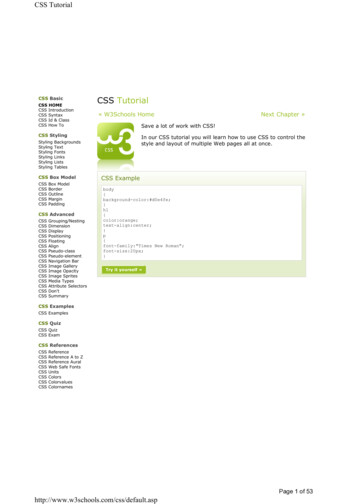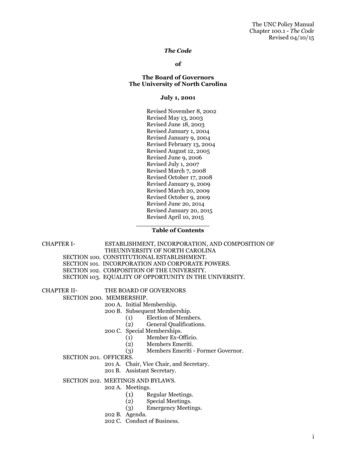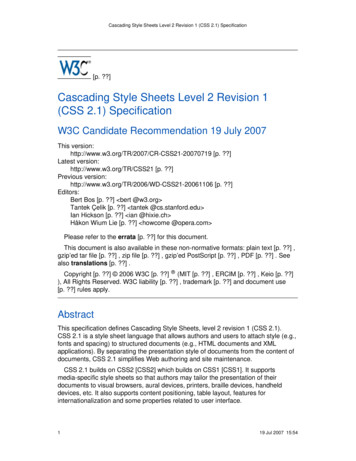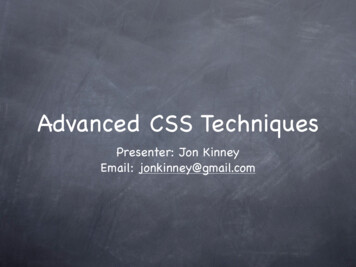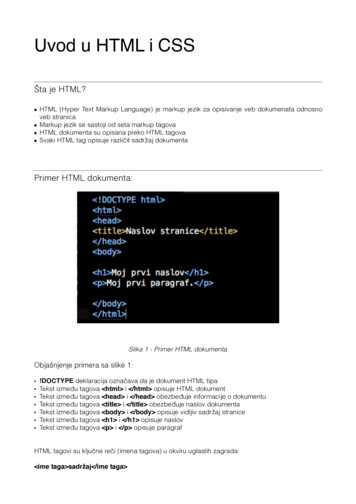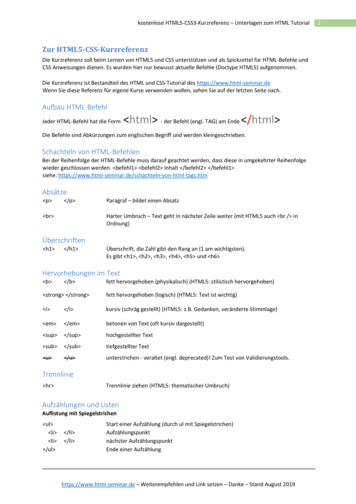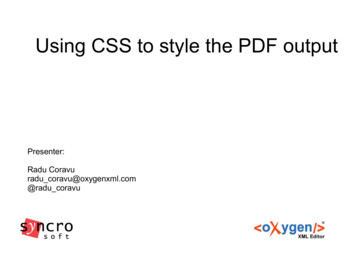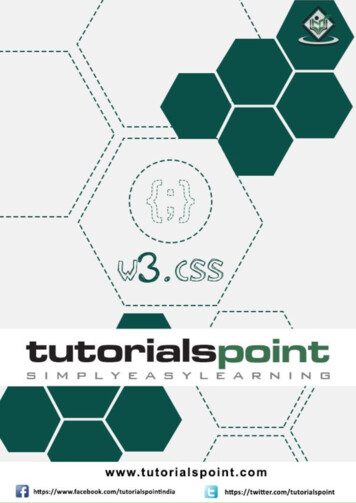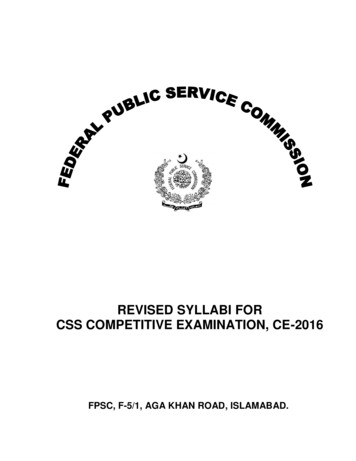
Transcription
REVISED SYLLABI FORCSS COMPETITIVE EXAMINATION, CE-2016FPSC, F-5/1, AGA KHAN ROAD, ISLAMABAD.
(i)INDEXSr. No.SubjectsPage No.1.Revised Scheme of CSS Competitive Examination2.English Essay3.English (Precis and Composition)05-064.General Science & Ability07-095.Current Affairs10-116.Pakistan Affairs12-147.Islamic Studies15-178.OR Comparative Study of Major Religions18-209.Accountancy & Auditing21-2501-030410. Agriculture & Forestry26-2711. Anthropology28-3012. Applied Mathematics31-3213. Arabic33-3514. Balochi36-3715. Botany38-4016. British History41-4317. Business Administration44-4718. Chemistry48-5219. Computer Science53-5620. Constitutional Law57-5821. Criminology59-6122. Economics62-6423. English Literature65-6624. Environmental Science67-6925. European History70-7226. Gender Studies73-7527. Geography76-7828. Geology79-82
(ii)Sr. No.SubjectsPage No.29. Governance & Public Policies83-8630. History of Pakistan & India87-8831. History of USA89-9032. International Law91-9233. International Relations93-9634. Islamic History & Culture97-10035. Journalism and Mass Communication101-10436. Law10537. Mercantile Law106-10938. Muslim Law & Jurisprudence110-11139. Pashto112-11340. Persian114-11641. Philosophy11742. Physics118-11943. Political Science120-12344. Psychology124-12545. Public Administration126-12846. Punjabi129-13047. Pure Mathematics131-13248. Sindhi133-13649. Sociology137-13850. Statistics139-14151. Town Planning & Urban Management142-14352. Urdu Literature144-14553. Zoology146-147
1Revised Scheme and Syllabus for CSS Competitive Examination-2016FEDERAL PUBLIC SERVICE COMMISSIONREVISED SCHEME OF CSS COMPETITIVE EXAMINATIONWRITTEN EXAMINATIONA:Code No.1.2.3.4.5.6.B:(1200 MARKS)COMPULSORY SUBJECTS (600 MARKS)SubjectsMarksEnglish EssayEnglish (Precis and Composition)General Science & AbilityCurrent AffairsPakistan AffairsIslamic Studies OR Comparative Study ofMajor Religions (For Non Muslims)Total100100100100100100OPTIONAL SUBJECTS (600 MARKS)Group-I: (To select one subject of (200 marks) only)Code No.11.12.13.14.15.SubjectAccountancy & AuditingEconomicsComputer SciencePolitical ScienceInternational RelationsMarks200200200200200Group-II: (To select subject(s) of 200 marks only)Code d MathematicsPure 0600
2Revised Scheme and Syllabus for CSS Competitive Examination-2016Group-III: (To select one subject of 100 marks only)Code No.22.23.24.25.SubjectBusiness AdministrationPublic AdministrationGovernance & Public PoliciesTown Planning & Urban ManagementMarks100100100100Group-IV: (To select one subject of 100 marks only)Code No.26.27.28.29.30.SubjectHistory of Pakistan & IndiaIslamic History & CultureBritish HistoryEuropean HistoryHistory of USAMarks100100100100100Group-V: (To select one subject of 100 marks only)Code No.31.32.33.34.35.36.37.SubjectGender StudiesEnvironmental SciencesAgriculture & ForestryBotanyZoologyEnglish LiteratureUrdu LiteratureMarks100100100100100100100Group-VI: (To select one subject of 100 marks only)Code No.38.39.40.41.42.43.44.SubjectLawConstitutional LawInternational LawMuslim Law & JurisprudenceMercantile LawCriminologyPhilosophyMarks100100100100100100100
3Revised Scheme and Syllabus for CSS Competitive Examination-2016Group-VII: (To select one subject of 100 marks only)Code ism & Mass 100100100100100100100100100100Note-1: Question papers in Urdu or other Pakistaniregional languages (Punjabi, Sindhi, Pashto andBalochi), Persian and Arabic should be answered in therespective languages unless otherwise directed in thequestion paper.Note-2: There will be two papers of 100 marks each ofthe subjects which carry 200 marks. In other subjects of100 marks there will be one paper. Each paper will be of3 hours duration.Note-3: The candidates should expect some objectivetype question (MCQ’s) in compulsory and optionalpapers.
4Revised Scheme and Syllabus for CSS Competitive Examination-2016PAPER:ENGLISH ESSAY(100 MARKS)Candidates will be required to write one or more Essay in English. A wide choice of topicswill be given.Candidates are expected to reflect comprehensive and research based knowledge on aselected topic. Candidate’s articulation, expression and technical treatment of the style ofEnglish Essay writing will be examined.
5Revised Scheme and Syllabus for CSS Competitive Examination-2016PAPER:ENGLISH (PRECIS & COMPOSITION)(100 MARKS)The examination in this subject will be based upon a paper carrying 100 marks to Test thecandidate’s abilities to handle Precis Writing, Reading Comprehension, SentenceStructuring, Translation, Grammar and Vocabulary, etc.I. Precis Writing (20 marks)A careful selected passage with an orientation of generic understanding and enoughflexibility for compression shall be given for précising and suggesting an appropriate title.Out of the total 20 marks allocated to this question, 15 shall go to précising the text and 5 tosuggesting the title.II. Reading Comprehension(20 marks)A carefully selected passage that is rich in substance but not very technical or disciplinespecific shall be given, followed by five questions, each carrying 4 marks.III. Grammar and Vocabulary (20 marks)Correct usage of Tense, Articles, Prepositions, Conjunctions, Punctuation, Phrasal Verbs,Synonyms and Antonyms etc.IV. Sentence Correction(10 marks)The sentences shall be given each having a clear structural flaw in terms of grammar orpunctuation. The candidates shall be asked to rewrite them with really needed correctiononly, without making unnecessary alterations. No two or more sentence should haveexactly the same problem, and 2-3 sentences shall be based on correction of punctuationmarks.V. Grouping of Words (10 marks)A random list of twenty words of moderate standard (neither very easy nor utterlyunfamiliar) shall be given, to be grouped by the candidates in pairs of those having similaror opposite meaning, as may be clearly directed in the question.VI. Pairs of Words(10 marks)Ten pairs shall be given of seemingly similar words with different meanings, generallyconfused in communication, for bringing out the difference in meaning of any five of them byfirst explaining them in parenthesis and then using them in sentences.
6Revised Scheme and Syllabus for CSS Competitive Examination-2016VII. Translation(10 marks)Ten short Urdu sentences involving structural composition, significant terms andfigurative/idiomatic expressions shall be given, to be accurately translated into English.SUGGESTED READINGSS.No.TitleAuthor1.English Grammar in UseRaymondMurphyUniversity Press).(Cambridge2.Practical English UsageM.Swan (Oxford University Press).3.The Little, Brown HandbookH. Ramsey Flower & Jane Aaron (TheLittle, Brown & Co; Harper Collins.)4.A University English GrammarR. Quirk & S. Greenbaum (ELBS;Longmans)5.Write Better, Speak BetterReaders Digest Association.6.Modern English in ActionHenry Christ (D.C. Heath & Co.)
7Revised Scheme and Syllabus for CSS Competitive Examination-2016PAPER:GENERAL SCIENCE & ABILITYPart-I (General Science)I. II. III. (100 MARKS)60 MarksPhysical SciencesConstituents and Structure:-Universe, Galaxy, Light Year, Solar System, Sun,Earth, Astronomical System of Units.Process of Nature: - Solar and Lunar Eclipses, Rotation and Revolution, WeatherVariables (Global Temperature, Pressure, Circulation, Precipitation, Humidity) andWeather Variations.Natural Hazards and Disasters: - Earth Quake, Volcanic Eruption, Tsunami,Floods, Avalanche, Travelling Cyclone (Tropical Cyclone, Middle Latitude Cycloneand Tornadoes), Drought, Wildfire, Urban Fire. Disaster Risk Management.Energy Resources: - Sources of Energy (Renewable i.e. LED Energy, SolarEnergy, Wind Energy and Non-Renewable Energy conservation and its sustainableuse.Atomic Structure, Chemical Bonding, Electromagnetic Radiations.Modern Materials/Chemicals: - Ceramics, Plastics, Semiconductors. Antibiotics,Vaccines, Fertilizers, Pesticides.Biological SciencesThe Basis of Life: - Cell Structures and Functions (Subcellular Organelles such asNucleus, Mitochondria and Ribosomes).Biomolecules: - Proteins, Lipids, Carbohydrates and Enzymes.Plant and Animal Kingdom: - A brief survey of plant and animal kingdom topinpoint similarities and diversities in nature.A Brief Account of Human Physiology.Common Diseases and Epidemics: - Polio, Diarrhea, Malaria, Hepatitis, Denguetheir Causes and Prevention.New Model Concept of Producing BIO Fuel MethodEnvironmental ScienceEnvironment: - The Atmosphere (Layered Structure and Composition), Hydrosphere(Water Cycle, Major Water Compartments), Biosphere (Major Biomes) andLithosphere (Minerals and Rocks, Rock Types, Plate Tectonics).Atmospheric Pollution: - Types, Sources, Causes and effects of major airpollutants (COx, Particulate Matter, NOx, SOx, Tropospheric Ozone, Volatile OrganicCompounds, Dioxins). Regional and Global air pollution issues (Acid-rain, OzoneDepletion, Greenhouse Effect and Global Warming). International agreements on airpollution control (Montreal Protocol and Kyoto Protocol).Water Pollution:- Types, sources, causes and effects of major water pollutants(Synthetic Organic Chemicals, Oxygen Demanding Wastes, Plant Nutrients, ThermalPollution, Infectious Agents, Sediments, Radioactivity, Heavy Metals and Acids).Drinking water quality and standards.Land Pollution: - Solid waste management and disposal.
8Revised Scheme and Syllabus for CSS Competitive Examination-2016 Role of Remote Sensing and GIS in Environmental Science.Population Planning.Food ScienceIV. Concept of Balance Diet: - Vitamins, Carbohydrates, Protein, Fats and oil,Minerals, Fiber. Quality of Food:- Bioavailability of Nutrients, Appearance, Texture, Flavor, Qualityof Packed and Frozen Food, Food Additives, Preservatives and Antioxidants Food Deterioration and its Control: - Causes of Food Deterioration, Adulteration,Food Preservation.Information TechnologyV. Computer (Hardware & Software Fundamentals); I/O Processing and datastorage, Networking & Internet Standards, Application and business Software, SocialMedia Websites. Information Systems. Fundamentals of artificial intelligence.Telecommunications: - Basics of Wireless Communication (Mobile, Satellite,Surveillance and GPS and Fiber Optic etc.Part-II (General Ability)40 MarksQuantitative Ability/ReasoningVI. Basic Mathematical Skills. Concepts and ability to reasons quantitatively and solve problems in aquantitative setting. Basic Arithmetic, Algebra and Geometry (Average, Ratios, Rates, Percentage,Angles, Triangles, Sets, Remainders, Equations, Symbols, Rounding of Numbers Random SamplingLogical Reasoning and Analytical Reasoning/AbilityVII. Logical Reasoning includes the process of using a rational, systematic series ofsteps based on sound mathematical procedures and given statements to arrive at aconclusion Analytical Reasoning/Ability includes visualizing, articulating and solving bothcomplex and uncomplicated problems and concepts and making decisions that aresensible based on available information, including demonstration of the ability toapply logical thinking to gathering and analyzing information.VIII.Mental Abilities Mental Abilities Scales that measures specific constructs such as verbal,mechanical, numerical and social ability.
9Revised Scheme and Syllabus for CSS Competitive Examination-2016SUGGESTED READINGSS. No.TitleAuthors1.Asimov's New Guide to Science 1993Isaac Asimov2.Science Restated: Physics and Chemistry for Harold Gomes Cassidythe Non-Scientist 19703.Eminent Muslim Scientists 1991S. Fakhre Alam Naqvi4.Exploring Life Science 1975Walter A. Thurber, RobertE. Kilburn, Peter S. Howell5.Exploring Physical Science 1977Walter A. Thurber, RobertE. Kilburn, Peter S. Howell6.Principles of Animal Biology 2011Lancelot Hogben7.The Impact of Science on Society 2005Isaac Asimov, A. S. a. N.A. S. a.8.Fundamentals of Forensic Science 2010Max M. Houck, Jay A.Siegal9.ForensicScienceFundamentals& Anthony J. BertinoInvestigation 200810.Physical Geography 2013Harm J. de Blij, Peter O.Muller, James E. Burt,Joseph A. Mason11.Physical Geography-Science and Systems of Alan H. Strahler, Arthur N.the Human Environment 2009Strallar.12.Introduction to Information Technology 2005I. T. L. Education SolutionsLimited, Itl.13.Management Information Systems 2014Ken Sousa, Effy Oz14.Fundamentals of Telecommunications 2005Roger L. Freeman15.Basics of Environmental Science 2002Michael Allaby16.Food Science 1998Norman N. Potter, JosephH. Hotchkiss17.Environmental Science: Systems andMichaelL.McKinney,Solutions. 5th ed. 2013Robert Schoch and LoganYonavjak18.Environmental Science: A Global ConcernWilliam P. Cunningham,2012Barbara Woodworth SaigoBooks for Logical Reasoning19.Logical ReasoningRob P. Nederpelt, FarouzD. Kamareddine20.Elements of Logical ReasoningJan Von Plato21.Reasoning Builder for Admission andStaff of ResearchStandardized TestEducation22.Test of ReasoningThorpe23.Mental AbilityDr. Lal & Jain24.The Brain Book: Know Your Own Mind andEdgar ThorpeHow to Use it
10Revised Scheme and Syllabus for CSS Competitive Examination-2016PAPER:CURRENT AFFAIRS(100 MARKS)Candidates will be expected to display such general knowledge of history, politics andInternational Affairs, as deemed necessary to interpret current affairs.I.II.Pakistan's Domestic Affairs (20 marks) Political Economic SocialPakistan's External Affairs (40 marks) Pakistan’s relations with its Neighbors (India, China, Afghanistan, Russia) Pakistan’s relations with the Muslim World (Iran, Saudi Arabia, Indonesia,Turkey) Pakistan’s relations with the United States Pakistan’s relations with Regional and International Organizations (UN, SAARC,ECO, OIC, WTO, CW)III.Global Issues (40 marks) International Security International Political Economy Human Rights Environment: Global Warming, Kyoto Protocol, Copenhagen Accord Population: world population trends, world population policies Terrorism and Counter Terrorism Global Energy Politics Nuclear Proliferation and Nuclear Security Nuclear Politics in South Asia International Trade (Doha Development Round and Bali Package) Cooperation and Competition in Arabian Sea, Indian and Pacific Oceans. Millennium Development Goals, Current Status, Globalization Middle East Crisis Kashmir Issue Palestine Issue
11Revised Scheme and Syllabus for CSS Competitive Examination-2016SUGGESTED READINGSS.No.TitleAuthor1.Pakistan Foreign PolicyConcise History, 20111947-2005:2.Issue in Pakistan’s Economy, 2010Akbar S. Zaidi3.Pakistan: A Hard Country, 2012Anatol Lieven4.Government & Politics in South Asia, 6th ed., Baxter,2009Oberst,5.IntroductiontoEconomy, 20106.International Organization (Second Edition) Volker Rittberger, Bernhard2012Zangl and Andress Kruck7.The Age of Deception: Nuclear Diplomacy in Mohamed ElbaradeiTreacherous Times (2011)8.International Relations, 20129.World Politics: Trends & Transformation, Kegley & Blanton201110.Pakistan Beyond the Crisis, 2011Maleeha Lodhi11.Globalization in Question, 2009Paul Hirst12.International Political Economy: Interests & Thomas OatleyInstitutions in the Global Economy, 201013.Politics and Change in the Middle East, 10th Andersen,Ed., Pearson, 2012Wagner14.Eating Grass: The Making of the Pakistani Feroz KhanBomb, (2012)InternationalA Abdul Sattar,Malik,Political David BalaamDillmanKennedy&&BradfordJoshua GoldsteinSeibert,and
12Revised Scheme and Syllabus for CSS Competitive Examination-2016PAPER:PAKISTAN AFFAIRS(100 MARKS)I.Ideology of Pakistan-----definition and elucidation, historical aspects: Muslim rule inthe Sub-Continent, its downfall and efforts for Renaissance. Movements forreforms-- Shaikh Ahmad Sarhindi, Shah Waliullah, Sayyid Ahmad Shaheed,Aligarh, Deoband, Nadwah, and other educational institutions-------SindhMadrassah and Islamia College Peshawae. Ideology of Pakistan in the light ofSpeeches and statements of Allama Iqbal and Quaid- i Azam Muhammad AliJinnah.II.Land and people of Pakistan------- Geography, Society, Natural resources,Agriculture, Industry and education with reference to characteristics, trends andproblems.III.Pakistan and Changing Regional ApparatusIV.Nuclear Program of Pakistan, its Safety and Security; International ConcernsV.Regional Economic Cooperation (SAARC,ECO,SCO) and the Role of PakistanVI.Civil-Military Relations in PakistanVII.Economic Challenges in PakistanVIII.Non-Traditional Security Threats in Pakistan: Role of Non-State ActorsIX.Pakistan’s Role in the RegionX.Palestine IssueXI.Changing Security Dynamics for Pakistan:PakistanXII.Political Evolution Since 1971XIII.Pakistan and US War on TerrorXIV.Foreign Policy of Pakistan Post 9/11XV.Evolution of Democratic System in PakistanXVI.Ethnic Issues and National IntegrationXVII.Hydro Politics ; Water Issues in Domestic and Regional ContextXVIII.Pakistan’s National InterestXIX.Challenges to SovereigntyXX.Pakistan’s Energy Problems and their EffectsXXI.Pakistan’s Relations with Neighbors excluding IndiaXXII.Pakistan and India Relations Since 1947XXIII.Kashmir IssueXXIV.The war in Afghanistan since 1979 and its impact on, and challenges to Pakistan,in the Post 2014 era.XXV.Proxy Wars: Role of External ElementsChallenges to National Security of
13Revised Scheme and Syllabus for CSS Competitive Examination-2016XXVI.Economic Conditions of Pakistan, the Most Recent Economic Survey, the Previousand Current Budgets, and the Problems and Performance of Major Sectors ofEconomy.XXVII. The Recent Constitutional and Legal Debates, the Latest ConstitutionalAmendments and Important Legislations, Legal Cases and the Role of HigherCourts.XXVIII. The Prevailing Social Problems of Pakistan and the Strategies to Deal with Them,Poverty, Education, Health and Sanitation.SUGGESTED READINGSS.No.1.2.3.4.5.6.7.8.9.TitleFederalism and Ethnic ConflictRegulation in India and Pakistan.Labor, Democratization andDevelopment in India and Pakistan.Perception, Politics and Security inSouth Asia: The Compound Crisis in1990.The Future of Pakistan.Frontline Pakistan: The Struggle withMilitant Islam.Modern South Asia: History, Culture,Political Economy.Democracy and Authoritarianism in SouthAsia.Conflict Between India and Pakistan: anEncyclopedia.Back to Pakistan: A Fifty Year Journey.10.Judging the State: Courts andConstitutional Politics in Pakistan.11.12.Pakistan: Manifest Destiny.Pakistan, America, and the Future ofGlobal Jihad.13.15.Kashmir in Conflict: India, Pakistan andthe Unending War.Islamic Law and the Law of ArmedConflict: The Armed Conflict inPakistan.Making Sense of Pakistan.16.A Brief History of Pakistan.14.AuthorAdeney, Katharine. , New York: PalgraveMacmillan, 2007.Candland, Christopher,New York: Routledge, 2007.Chari, P.R. at al, New York: Routledge,2003.Cohen Stephen P. et al. Washington:Brookings Institute Press, 2011.Hussian, Zahid. New York: I.B.Tauris,2007.Jalal, Aisha and Bose, Sugata.New York: Routledge, 1998.Jalal, Aisha, Cambridge: CambridgeUniversity Press, 1995.Lyon, Peter. California: ABC-CLIO,2008.Mass, Leslie Noyes. Plymouth: Rowman& Littlefield Publishers, 2011.Newberg, Paula R. Cambridge:Cambridge University Press, 1995.Qureshi, Atiff. London: Epic Press, 2009.Riedel, Bruce. Deadly Embrace:Washington: Brookings Institute Press,2011.Schofield, Victoria.New York: I.B.Tauria, 2003.Shah, Niaz A. New York: Routledge,2011.Shaikh, Farzana. New York: ColombiaUniversity Press, 2009.Wynbrandt, James.New York: Infobase Publishing, 2009.
14Revised Scheme and Syllabus for CSS Competitive Examination-201617.18.Powering Pakistan: Meetings PakistanRobert M. Hathaway and MichaelEnergy Needs in 21st CenturyGugelmanPakistan’s Energy Sector: From Crisis to Zaid AlahdadCrisis-Breaking the Chain
15Revised Scheme and Syllabus for CSS Competitive Examination-2016PAPER:ISLAMIC STUDIES(100 MARKS)I. Introduction of Islam. Concept of Islam. Importance of Deen in Human Life. Difference between Deen and Religion. Distinctive Aspects of Islam. Islamic Beliefs & its Impact on Individual & Society and the Fundamental of Islam Islamic Worships: Spiritual, Moral and Social Impact.II. Study of Seerah of Prophet Mohammad (PBAH) as Role Model for:IndividualDiplomatEducatorMilitary StrategistPeace Maker Human Rights & Status of Woman in Islam.Human Rights and Status of Woman in IslamDignity of Men and WomenIII.IV. V.Islamic Civilization and Culture:Meanings and the Vital ElementsRole of Civilization in Development of Human Personality and CommunitiesDistinctions of Islamic Civilization (Tauheed, Spiritualism, Dignity of Man, Equality,Social Justice, Moral Values, Tolerance, Rule of Law) Islam and World.Impact of Islamic Civilization on the West and Vice VersaThe Role of Islam in the Modern World.Muslim World and the Contemporary Challenges.Rise of Extremism. Public Administration and Governance in IslamConcept of Public Administration in IslamQuranic Guidance on Good GovernanceConcept of Governance and its Applications in the light of Quran, Sunnah and Fiqh.Governance Structure in Islam i.e. (Shura, Legislation, Sources of Islamic Law)Governance under Pious KhelifatParticular letters of Hazrat Umar (R.A) and Hazrat Ali (R.A) to different Authority.Responsibilities of Civil ServantsSystem of Accountability in IslamVI.VII. Islamic Code of Life.Salient Features of Islamic Systems, Social System, Political System, EconomicSystem, Judicial System, Administrative System,Procedure of Ijmah and Ijtehad
16Revised Scheme and Syllabus for CSS Competitive Examination-2016REQUIRED READINGSSr. No.TitleAuthor1.Introduction of IslamDr. Hamidullah2.Islam: its meaning and MessageKhurshid Ahmad3.Islam: The Misunderstood ReligionMuhammad Qutub4.Islam at the crass roadMohummadAsad5.Islam and the Economic ChallengeUmer Chapra6.A brief Survey of Muslim Science and CultureM. Abdur Rahman7.Administrative Development an Islamic PerspectiveMuhammad Al-Buraey8.Quranic SciencesAfzalur Rahman9.Islamization of PakistanIqbal Zafar10.Islamic Law and ConstitutionAbul A’ la Mawdudi,11.Insan e KamilDr Khalid Alvi12.Islami Tehzeeb Kay Chund Darakhshan PehlooMustafa Sabbai13.Islam Aur Tahzeeb -e -Maghrib Ki Kash MakashDr Muhammad Ameen,14.Aurat Maghrib aur IslamSerwat Jamal Asmaui15.Seerat-un-Nabi Vol. IShibli Nu’mani16.Islam and Secular MindEdited by Tarik Jan17.Khilafat-o-MalookiatAbul A’ la Mawdudi,RECOMMENDED READING1.Towards Understanding IslamAbul A’ la Mawdudi,2.Ideals and Realities of IslamHussain Nasr,3.Administrative Development; an IslamicAlburacy Muhammad A.Perspective, KP.L. London4.Arab AdministrationHussain Shah5.The Islamic Republic : Politics, Law and EconomyHassan Dr. S. Farooq
17Revised Scheme and Syllabus for CSS Competitive Examination-20166.Studies in Muslim Political Thoughts andSherwani, H.K.S.Administration7.Reconstruction of Religious Thoughts in IslamAllama Iqbal8.Islamic Political System in the Modern age:Ahmad ManzooruddinTheory and Practice9.Sovereignty-Modern and Islamic:Ilays Ahmad10.Islam in Transition: Muslim PerspectivesDonohue J, John A. andEsposito L. John (eds)11.Islam Aik Nazar MainSudderud Din Islahi12.IslamiNazria e HayatKhurshid Ahmad13.Islami Nizam e Zindgi aur us kay Bunyadi TassworatAbul Aala Maudoodi14.Jadah o ManzilSeyyed Kotub15.Islam ka Nizam e HakoomatMaulana Hamid ul Ansari16.Islami NizamDr Yousof Qerzawi,17.Bonyadi HaqooqMuhammad Salahuddin18.Islam Ka Muashi NizamJustice Taqi Usamani,19.Tahzeeb o Tamaddon e IslamiRasheed Akhter Nadvi20.First Principle of Islamic EconomicsAbul A’ la Mawdudi21.Islamic Civilization Foundations Belief & PrinciplesAbul A’ la Mawdudi22.Workship in IslamAbul A’ la Mawdudi23.Let us be MuslimsKhurram Murad24.Women and Social Justice; an Islamic ParadigmProf. Dr. Anis Ahmad
18Revised Scheme and Syllabus for CSS Competitive Examination-2016PAPER:COMPARATIVE STUDY OF MAJOR RELIGIONS(100 MARKS)(Alternative Paper in Lieu of the Compulsory Islamic Studies)I. Introduction Definition(s) of religionEmergence of the study of religion as a disciplineTheological and academic study of religionAn overview of religious landscape of the WorldII. Hinduism Historical BackgroundIndus valley civilization, Aryan invasion theory, Vedic Dharma, Brahmanism Scriptures:Sruti: Vedas, Upanishads, Smirti: Manu Smirti, Sutras, Puranas, Great epics: Ramayana,Mahabharata Hindu Doctrines:Dharma, Vedanta, Karma, Transmigration of Souls, Moksha (Liberation) Ways to Liberation:Karma marga (Works/Rituals), Jnana marga (Wisdom), Bhakti marga (Devotion) Hindu gods:Brahma, Vishnu, Shiva, Trimurti, other gods and divinities Major Hindu Sects:Vaishavism (Manifestation avatars), Saivism (Supreme God & Phallic worship), Saktism(Goddess worship) Hindu society:Caste System, Ashramas (Stages of life) Hinduism in the Modern World19th century reform and revival movements, Contemporary Hindu Tendencies andmovementsIII. Buddhism Historical BackgroundLife of Gautama Buddha, Formation and spread of Buddhism, Rivalry between Brahmanismand &Buddhism Scriptures:Tripitaka: Sutta Pitaka, Vinaya Pitaka, Abhidhamma Pitaka Teachings and DoctrinesThree Jewels of Buddhism: Buddha, Dhamma, Sangha, The four noble truths, Eight foldPath Buddhist Sects:Theravadas (Hinayana), Mahayana, other schools and sects Buddhism in the Modern world
19Revised Scheme and Syllabus for CSS Competitive Examination-2016IV. Judaism A brief history of Jews and Judaism:From Abraham to Moses, peace be upon them all, From Moses to establishment of Jewishrule, Destruction of Jerusalem and dispersion of Jews in the world, Jewish Scriptures:Tanakh (The Torah, the Prophets, and the Writings), Mishnah and Talmud Articles of faith and basic teachings:Ten Commandments, The thirteen principles of faith propounded by Moses Maimonides(1138-1204) Jewish holidays and festivals:Yom Kippur (The Day of Atonement), Pesach (Passover), Sukkot (Tabernacles) Purim Jewish Worship:Daily prayer, fasting, Sabbath Jewish sects and movementsOrthodox Judaism, Conservative Judaism, Reform Judaism, Zionism, Kabbalah, HasidismV. Christianity Historical background:Jewish background of Christianity, Life and of Jesus Christ (Through the Four Gospels), Lifeand the role of Paul (Through the Letters of Paul), Formation and spread of the ChristianChurch, Christianization of the Roman Empire, Reform movement Scriptures:The Holy Bible (Old Testament and New Testament) Basic Doctrines:Original Sin, Incarnation of God, Crucifixion and Resurrection of Jesus Christ, Atonement,Trinity Christian Sects:Catholicism, Eastern Orthodoxy, ProtestantismSub-denominations: Lutherans, Reformed and Presbyterians, Anglicans, Baptists,Methodists, Unitarians Christian Festivals and Holidays:Advent, Christmas, Easter, Pentecost Christian worship and SacramentsBaptism, Eucharist, Communion, Lord’s Supper, prayer, fasting, psalms, music, Christianity in the Modern TimesEncounter with modernity, modern theological trends, Missionary movement, Dialogue andrelationship with other religionsVI. Islam Introduction and Historical BackgroundIslamic concept of religion, universality of religion and diversity of shari‘ahs, Sirah (Life) ofthe Holy Prophet Muhammad, peace be upon him, The era of rightly guided caliphs of Islam
20Revised Scheme and Syllabus for CSS Competitive Examination-2016 Sacred Scriptures:The Holy Quran, Hadith Basic Doctrines and Creed:Tawhid (Oneness of God), Risalah (Belief in Prophets and finality of the prophet-hood withthe Prophet Muhammad), Akhirah (Belief in Hereafter and the final reckoning by Allah theAlmighty), Belief in angels, previous scriptures, predestination and human responsibilitybefore God, infallibility of the Quran Five Pillars of Islam:Utterance of Shahadatayn (To proclaim the Oneness of Allah and that Prophet Muhammadis his messenger, salah (five daily prayers), zakah (compulsory charity), sawm (fasting in themonth of Ramadan) and Hajj (pilgrimage to Makkah who can afford travelling to it) Other Teachings of IslamEquality of mankind, simplicity, spiritual purity and bodily hygiene, patience, contentment,moderation, social justice, Jihad, tolerance towards other religions, Sects and SchoolsSunnis (mainstream Muslims), Shi‘ahs (Special devotion for Hazrat Ali and Family of theProphet), Khawarij (literalists), Mu‘tazilah (rationalists) Contemporary Islamic movements and tendencies:Ikwan al Muslimun (Muslim Brotherhood), Jama‘at-i-Islami, Tablighi Jama‘at, Salafimovement, Fethullah Gulen movement in Turkey, Iranian revolution, extremist groups.SUGGESTED READINGSS.No.1.2.3.4.5.6.TitleApproaches to the Study of Religion,1999The Penguin Hand Book of World’sLiving Religions, 2010.Dunya Kay Baray Mazahib (MajorReligions of the World)Hinduism: A Short Introduction, 2006.Exploring Buddhism, , 2012.Judaism: A Short Introduction, 1999.AuthorPeter Connolly (ed.)John R. Hinnells (ed.)Imadul Hasan Azad FaruqiKlaus K. KlostermaierChristmas HumphreysLavinia and Dan CohnSherbok7. Christianity: An Introduction, 2006.Alister E. McGrath8. The Messenger: The Meanings of the Tariq RamadanLife of Muhammad, 20089. Ideals and Realities of Islam, 1993.Seyyed Hossein Nasr10. Towards Understanding Islam, 1992.Syed Abul ‘Ala Maududi
21Revised Scheme and Syllabus for CSS Competitive Examination-2016PAPER:ACCOUNTANCY & AUDITING(200 MARKS)Paper-I (MARKS-100)(A)Financial Accounting (50 Marks)I.Fundamental Accounting Principles, Concepts, Assumptions and Conventions:Nature and Scope of Accounting, Accrual/Matching Concept, Consistency ofPresentation and Comparability, True and Fair View, Neutrality, Materiality, Prudence,Completeness, Understandability and Usefulness, Going Concern, and Substanceover Form.II.Accounting Cycle/Process and Financial Statements: Transactions and/or Events,General Journal, General Ledger, Trial Balance (U
Revised Scheme of CSS Competitive Examination 01-03 2. English Essay 04 3. English (Precis and Composition) 05-06 4. General Science & Ability 07-09 5. Current Affairs 10-11 6. Pakistan Affairs 12-14 7. Islamic Studies 15-17 8. OR Comparative Study of Major Religions 18-20 9. Accountancy & A
